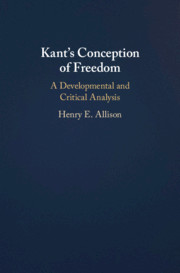Book contents
- Kant’s Conception of Freedom
- Kant’s Conception of Freedom
- Copyright page
- Dedication
- Contents
- Preface
- Acknowledgments
- Note on Sources and Key to Abbreviations and Translations
- 1 Kant’s Writings of the 1750s and the Place in Them of the Free Will Issue
- 2 Kant’s Theoretical Philosophy in the Early 1760s and Its Relation to His Conception of Freedom
- 3 Kant’s Moral Philosophy in the Early 1760s
- 4 Kant’s Dialogue with Rousseau Supplemented by His Dreams of a Spirit-Seer
- 5 From the “Great Light” to the “Silent Decade”: Kant’s Thoughts on Free Will 1769–1780
- 6 Kant’s Account of Free Will in the Critique of Pure Reason
- 7 From the Critique of Pure Reason to the Groundwork
- 8 The Fact of Reason and Freedom in the Critique of Practical Reason
- 9 The Critique of the Power of Judgment and the Transition from Nature to Freedom
- 10 Kant’s Final Thoughts on Free Will
- Bibliography
- Index
1 - Kant’s Writings of the 1750s and the Place in Them of the Free Will Issue
Published online by Cambridge University Press: 19 December 2019
- Kant’s Conception of Freedom
- Kant’s Conception of Freedom
- Copyright page
- Dedication
- Contents
- Preface
- Acknowledgments
- Note on Sources and Key to Abbreviations and Translations
- 1 Kant’s Writings of the 1750s and the Place in Them of the Free Will Issue
- 2 Kant’s Theoretical Philosophy in the Early 1760s and Its Relation to His Conception of Freedom
- 3 Kant’s Moral Philosophy in the Early 1760s
- 4 Kant’s Dialogue with Rousseau Supplemented by His Dreams of a Spirit-Seer
- 5 From the “Great Light” to the “Silent Decade”: Kant’s Thoughts on Free Will 1769–1780
- 6 Kant’s Account of Free Will in the Critique of Pure Reason
- 7 From the Critique of Pure Reason to the Groundwork
- 8 The Fact of Reason and Freedom in the Critique of Practical Reason
- 9 The Critique of the Power of Judgment and the Transition from Nature to Freedom
- 10 Kant’s Final Thoughts on Free Will
- Bibliography
- Index
Summary
Although it was not Kant’s first publication,1 our story begins in 1755 with a brief look at a lengthy work with the unwieldy title Universal Natural History and Theory of the Heavens or Essay on the Constitution and the Mechanical Origin of the Whole Universe According to Newtonian Principles [Allgemeine Naturgeschichte und Theorie des Himmels oder Versuch von der Verfassung und dem mechanischen Ursprunge des ganzen Weltgebäudes, nach Newtonischen Grundsätzen abgehandelt] (henceforth referred to as Theory of the Heavens). Despite the fact that, as the title indicates, its subject matter is far removed from the question of free will, it requires inclusion in an investigation of the development of Kant’s views on the topic, because it defines the scientific framework in which Kant formed his first thoughts on the matter. These thoughts are first expressed in a work that Kant published in the same year as the above: A New Elucidation of the First Principles of Metaphysical Cognition [Principium primorum cognitionis metaphysicae nova dilucidatio] (henceforth referred to as New Elucidation). Accordingly, it will be the central focus of this chapter. But also requiring consideration in this context are Kant’s 1759 essay “An attempt at some reflections on optimism” [Versuch einiger Betrachtungen über den Optimismus], as well as three closely related Reflexionen dealing with the same topic. Thus, the chapter is divided into three parts, which together give us a first glance at Kant’s incipient conception of freedom of the will and related topics, many of which will be further developed in his subsequent writings.
- Type
- Chapter
- Information
- Kant's Conception of FreedomA Developmental and Critical Analysis, pp. 1 - 44Publisher: Cambridge University PressPrint publication year: 2020



